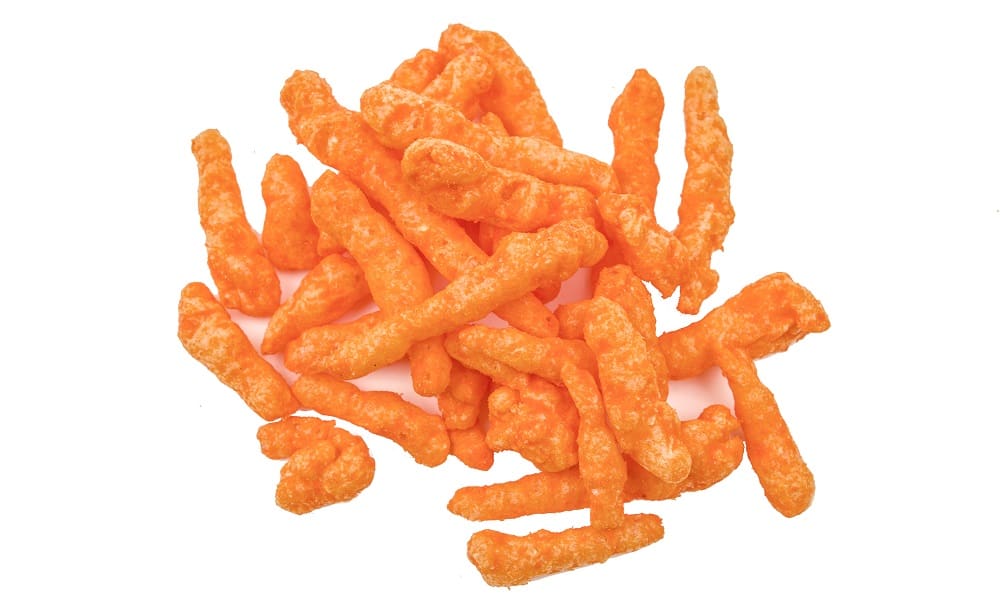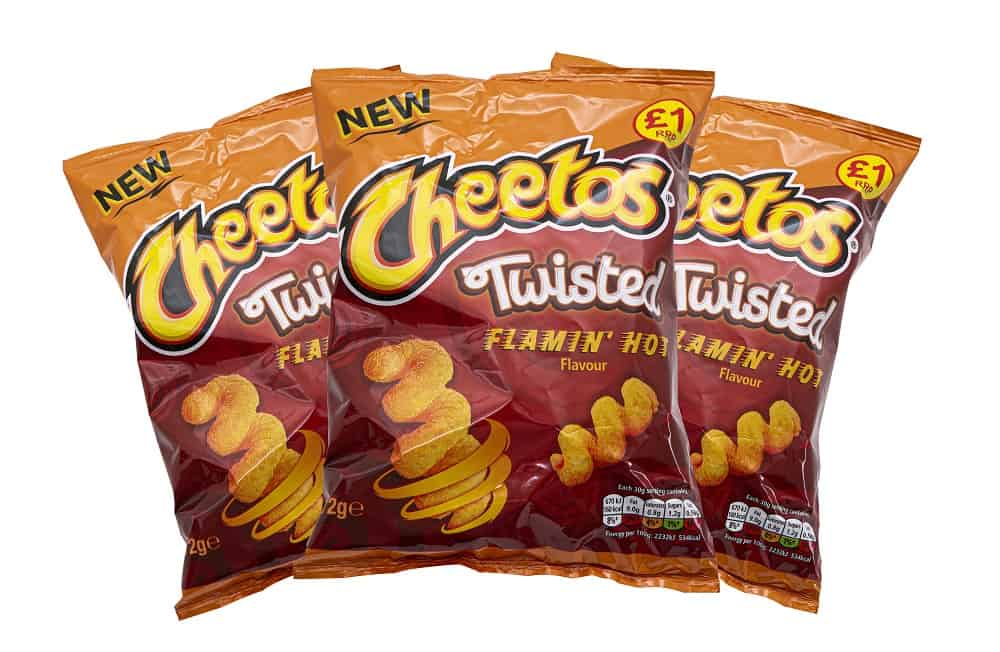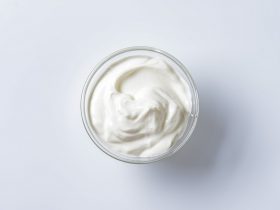Spicy chips, like hot Cheetos, will not do any harm to the developing fetus. At present, eating spicy foods during pregnancy is considered generally safe, except for some issues regarding worsening of particular pregnancy symptoms.
Spicy Foods During Pregnancy
There are a lot of concerns surrounding consumption of spicy foods during pregnancy. There is no evidence to a number of traditional views about spicy foods being harmful to pregnant women and their unborn offspring.
A lot of Pregnant Woman Crave Spicy Food
It is actually common for pregnant women to crave spicy foods (Bayley et al., 2002). Although direct reasons for this are unknown, a most likely explanation is due to the hormonal changes that happen during pregnancy.
These changes affect a pregnant woman’s senses of taste and smell, and in turn, their food preferences and aversions as well. Food cravings may be linked to the same changes in hormones that make pregnant women feel nauseous early in their pregnancy (Bayley et al., 2002).
In 2014, Orloff & Hormes investigated other theories regarding pregnant women’s cravings for spicy foods. One theory that they found is that pregnant women often feel hot, and spicy foods stimulate them to sweat and cool down. Another theory suggested that food cravings may be a result of nutritional deficits.
The same study also revealed that cravings during pregnancy are common across different cultures, but specific food types may be dictated primarily by cultural influences. However, not one of these conclusions can be proven with certainty (Orloff & Hormes, 2014).
Spicy Foods Can Worsen Morning Sickness
During the first trimester of pregnancy, spicy foods can worsen morning sickness. If a pregnant woman already suffers from an all-day nausea, consuming spicy foods can trigger the release of stomach acid and make nausea and vomiting worse.
Spicy Foods Can Trigger Heartburn
Spicy foods are more likely to cause heartburn in the second and third trimesters of pregnancy. The lower pressure on the esophageal sphincter, caused by the increasing pressure on the abdomen from the growing baby inside the uterus, makes gastroesophageal acid reflux more common during this time (Ramu et al., 2010).
It is safe to eat spicy foods anytime during pregnancy, but they can worsen symptoms of heartburn during the latter stages and can cause increased discomfort for pregnant women.
Spicy Foods Can Cause Diarrhea
Spicy foods can cause diarrhea, bloating and increased gas in any person, and not just in pregnant women. Capsaicin is considered the active component in chili that is responsible for the gastrointestinal side effects of spicy foods (Hammer & Vogelsang, 2007). Capsaicin irritates the stomach and digestive system, leading to diarrhea in people who are not used to it.
During pregnancy, the main concern with diarrhea is the possibility of dehydration. Therefore, pregnant women who eat spicy foods must increase their intake of fluids and make sure that they remain well hydrated. Moreover, if a pregnant woman is not used to eating spicy foods but suddenly craves for them, it is best to start slowly with milder types and fewer amounts, before working her way up, to build tolerance.
Myths Surrounding Spicy Food During Pregnancy

Spicy Foods are Harmful for the Baby and Can Burn the Baby’s Eyes, Leading to Blindness
There is no scientific evidence to this belief. Consumption of spicy foods during pregnancy is safe and cannot cause harm to the baby. Pregnant women develop food aversions, including avoidance of spicy foods, associated with their symptoms of nausea and vomiting during the early trimester of pregnancy.
Placek et al. in 2017 reported that food aversions during pregnancy, including avoidance of spicy foods, supports a protective role against plant teratogens. However, their results also showed aversions to staple foods like rice, which does not support the same theory. Therefore, culturally transmitted food aversions may play a larger role.
Spicy Foods Can Cause a Miscarriage and Help in the Induction of Labor
Spicy foods do not cause premature birth. Neither can it help induce labor, despite consumption of spicy foods being one of the common nonprescribed methods of trying to hasten labor.
In 2011, Chaudhry et al. revealed that as much as 50.7% of pregnant women often turn to traditional customs in order to induce labor and end the discomforts they feel during pregnancy. Over 10% of the women they surveyed said that they have tried eating spicy foods. However, their results showed that these attempts had no effect on labor.
Craving Spicy Foods During Pregnancy Predicts the Baby’s Gender
This myth circulated in 2008 when Daily Mail Online announced that according to a survey done by gurgle.com, pregnant women who craved spicy foods were more likely to be carrying baby boys. In spite of this claim, the reality is that no clear conclusion can be drawn from that survey. Cravings, unfortunately, are not a reliable predictor for an unborn baby’s gender.
Eating Spicy Foods When Pregnant Can Make the Baby Move Inside the Womb
There are anecdotal reports of pregnant mothers sensing their babies kick or move more often after they have eaten spicy foods. However, these stories have not been proven scientifically. What is currently known is that babies in utero respond when their mothers have eaten any type of food (with no preference to any particular kind).
In 2014, Bradford & Maude did a survey among pregnant women and their baby’s activity. They found that 74% reported an increased activity during meal times. The most likely reason is the increase in blood sugar after food consumption.
Spicy Foods and their Safety During Pregnancy

Chili
These are safe whether green, red or any other type of chili pepper. Just make sure to wear gloves and avoid touching your eyes and skin, especially when handling a hot variety. Wash your peppers properly and wash your hands before and after food preparation.
Chips
All spicy chips are safe in pregnancy. Popular brands are Hot Cheetos, Doritos Flamin’ Hot, Seabrook Scorchin’ Hot Fire Eaters, and Takis Fuego. However, these snacks are also high in sodium and must be consumed in moderation.
Hot Sauce
Bottled, shelf-stable varieties of hot sauce from supermarkets are safe to consume. Just be cautious around “fresh” hot sauce or salsa. Pregnant women should check if the ingredients used were cooked or pasteurized.
Spicy Mayonnaise
The safety of consuming mayonnaise depends on the ingredients used. Check the label whether pasteurized eggs were used, instead of raw eggs, to avoid the risk of contamination with Salmonella. Commercial mayonnaise is usually safe, but homemade ones should be verified for use of any undercooked eggs.
Spicy Tuna Roll Sushi
Tuna, whether spicy or not, should be thoroughly cooked for it to be safe for consumption in pregnancy. Raw and undercooked fish may harbor bacteria and parasites that can cause food borne illnesses. Therefore, raw sushi should be avoided by pregnant women.
In addition, tuna can contain high levels of mercury that can be passed down to the fetus and cause neurologic damage. Hence, it is also advised that pregnant women limit their intake of tuna dishes.
Spicy Curry
Indian, Thai, or other types of curry are safe for pregnant women to eat. Nevertheless, keep in mind your tolerance to spicy foods and your susceptibility to having heartburns and indigestion.
Final Verdict
Eating spicy foods during pregnancy will not hurt your growing baby. However, if a pregnant mother is not used to consumption of these foods, she may develop uncomfortable symptoms and even worsen the pregnancy discomforts she may already have.
Therefore, although pregnant women can safely give in to their cravings for hot Cheetos, it is best to take it slow and limit their intake according to their tolerance for spicy foods.
References
- https://www.webmd.com/
- https://www.nct.org.uk/
- https://www.healthline.com/
- https://www.medicalnewstoday.com/
- Bayley, T., Dye, L., Jones, S., DeBono, M., & Hill, A. (2002). Food cravings and aversions during pregnancy: Relationships with nausea and vomiting. Appetite 38(1), 45-51. https://doi.org/10.1006/appe.2002.0470
- Bradford, B., & Maude, R. (2014). Fetal response to maternal hunger and satiation: Novel finding from a qualitative descriptive study of maternal perception of fetal movements. BMC Pregnancy and Childbirth 14, 288. https://doi.org/10.1186/1471-2393-14-288
- Chaudhry, Z., Fischer, J., & Schaffir, J. (2011). Women’s use of nonprescribed methods to induce labor: A brief report. Birth 38(2), 168-171. https://doi.org/10.1111/j.1523-536X.2010.00465.x
- Daily Mail Online. (2008). Pregnant and craving spicy food: You are probably carrying a boy. https://www.dailymail.co.uk/health/article-1017101/Pregnant-craving-spicy-food-You-probably-carrying-boy.html
- Hammer, J., & Vogelsang, H. (2007). Characterization of sensations induced by capsaicin in the upper gastrointestinal tract. Neurogastroenterology and Motility 19(4), 279-287.
- Orloff, N., & Hormes, J. (2014). Pickles and ice cream! Food cravings in pregnancy: Hypotheses, preliminary evidence, and directions for future research. Frontiers in Psychology 5, 1076. https://doi.org/10.3389/fpsyg.2014.01076
- Placek, C., Madhivanan, P., & Hagen, E. (2017). Innate food aversions and culturally transmitted food taboos in pregnant women in rural Southwest India: Separate systems to protect the fetus. Evolution and Human Behavior 38(6), 714-728. doi: 10.1016/j.evolhumbehav.2017.08.001
- Ramu, B., Mohan, P., Rajasekaran, M. S., & Jayanthi, V. (2010). Prevalence and risk factors for gastroesophageal reflux in pregnancy. Indian Journal of Gastroenterology 30, 144-147. https://doi.org/10.1007/s12664-010-0067-3




